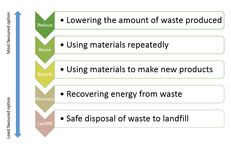SORTED Guide to Sustainability in Further Education – Part 5 - Estates and Operations – 5.3 Estates and Operations: resource efficiency and waste
Introduction to the topic area
Every resource purchased has financial and environmental costs associated with its raw materials, manufacture and transportation. Once an item has been used, it then needs to be disposed of. Waste policy has evolved from diverting waste from landfill, to using resources in the most effective way while minimising the impact of their use on the environment. Following the waste management hierarchy helps to improve efficiencies, and avoid high landfill disposal costs and taxes.
Organisational value of embedding sustainability in this area
- The cost of waste disposal is increasing annually in the UK. This is to incentivise organisations to both reduce the overall quantity of waste, and to select the most appropriate and economic alternative for disposal. Landfill tax, which is paid in addition to disposal costs, rose from £7/tonne in 1996 to £82.60/tonne in 2015.
- The legal obligations on the disposal of waste are also continually increasing. Education providers need to be aware of their responsibilities, and act accordingly. The EU Waste Framework Directive provides the legislative framework for the collection, transport, recovery and disposal of waste. In the UK, the Waste (England and Wales) (Amendment) Regulations 2014 specify that the waste hierarchy must be followed.
- Sustainable waste management can also have wider benefits, for example community-based projects for reusing items can benefit social cohesion.
Wider benefits of embedding sustainability in this area
Reducing waste contributes to national policy drivers being met:
- The Review of Waste Policy in England in 2011 set out commitments to move towards a zero waste economy, prioritising efforts to manage waste in line with the waste hierarchy and to reduce the carbon impact of waste.
- The overarching policy document for waste in Scotland is Scotland’s Zero Waste Plan, published by the Scottish Government in June 2010. This document sets out the Scottish Government’s vision for a zero waste society where waste is treated as a resource. The plan includes landfill bans for specific waste types. The Waste (Scotland) Regulations were passed by Scottish Parliament in 2012 to implement the strategy.
- In Wales, the Towards Zero Waste strategy was published by the Welsh Government in June 2010, with a framework for improving resource efficiency until 2050. Statutory waste and recycling targets were set in 2010 with the Waste (Wales) Measure. Every local authority in Wales must meet recycling targets which will rise gradually to 70% by 2025.
- The Northern Ireland Waste Management Strategy, Delivering Resource Efficiency was published in 2013 and sets the policy framework for the management of waste in Northern Ireland.
Getting started
- Assess your current waste, how much is produced, what types of waste are generated, which departments create what, and where the waste is disposed to.
- Identify opportunities for savings – use the waste hierarchy to identify where waste can be eliminated, reduced, reused and recycled.
- Establish priorities for action – establish some “quick wins”, which activities would achieve the greatest results (e.g. volume/weight of waste, value of disposal costs saved), and the fastest results?
- Take time to understand what is being disposed of, and if specialist disposal is required – use the government guidance to classify different types of waste and understand your legal requirements for disposing of this. For example, batteries, fluorescent lighting tubes, and oily rags cannot be mixed with landfill waste and will require specialist disposal. More info here.
- Ensure recycling containers are in the right place for the users, and well labelled to avoid risks of contamination.
- Work closely with waste contractors – agree data collection requirements to enable you to monitor your waste effectively.
- Record waste disposed via different routes, and costs.
- Feedback to staff, students and senior management team. achievements and cost savings made through the waste scheme.
- Ask your EAUC colleagues for support via the EAUC Communities of Practice and Topic Support Networks.






 Except where otherwise stated, content on this site is
licensed under a Creative Commons Attribution 3.0 License.
Except where otherwise stated, content on this site is
licensed under a Creative Commons Attribution 3.0 License.
